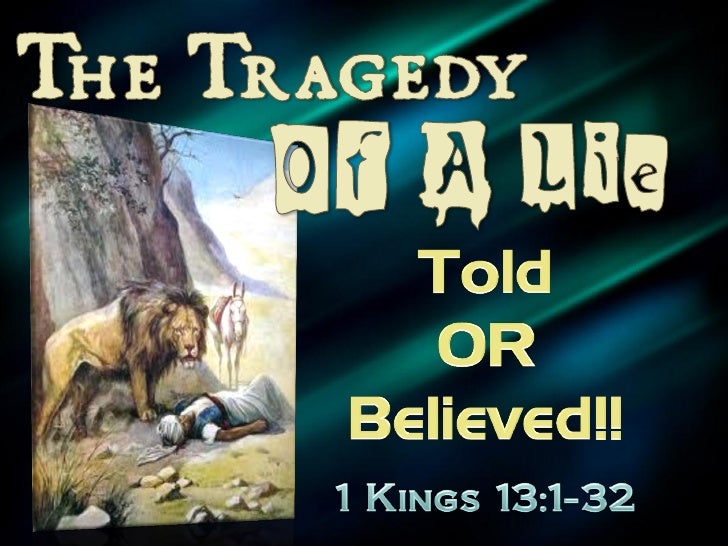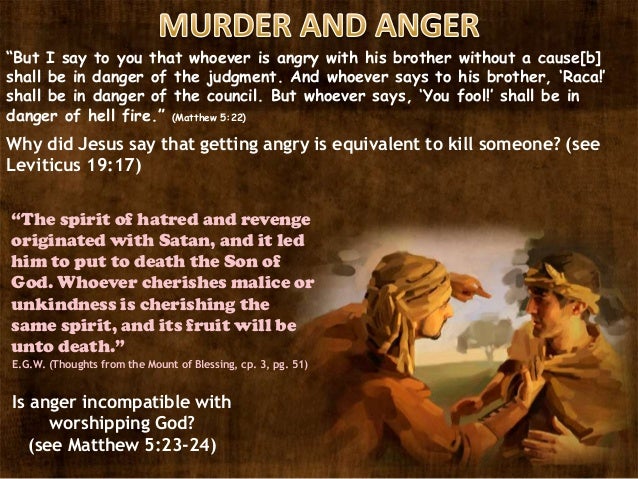Why did Jesus warn against saying the word raca in Matthew 5:22?
NET ©
|
But I say to you that anyone who is angry with a brother will be subjected to judgment. And whoever insults a brother will be brought before the council, and whoever says ‘Fool’ will be sent to fiery hell.
|
The meaning of the term
μωρός (
mwros) is somewhat disputed. Most take it to mean, following the Syriac versions, “you fool,” although some have argued that it represents a transliteration into Greek of the Hebrew term
מוֹרֵה (
moreh) “rebel” (
Deut 21:18, 20; cf. BDAG 663 s.v.
μωρός c).
RACA - ra'-ka, ra-ka'> (rhaka, Aramaic reqa', from req, "empty"): Vain or worthless fellow; a term of contempt used by the Jews in the time of Christ. In the Bible, it occurs in
Mt 5:22 only.
Chrysostom (who was acquainted with Syriac as spoken in the neighborhood of Antioch) says it was equivalent to the Greek su, "thou," used contemptuously instead of a man's name. Jerome rendered it inanis aut vacuus absque cerebro. It is generally explained as expressing contempt for a man's intellectual capacity (= "you simpleton!"), while more (translated "thou fool"), in the same verse is taken to refer to a man's moral and religious character (= "you rascal!" "you impious fellow!"). Thus we have three stages of anger, with three corresponding grades of punishment: (1) the inner feeling of anger (orgizomenos), to be punished by the local or provincial court (te krisei, "the judgment"); (2) anger breaking forth into an expression of scorn (Raca), to be punished by the Sanhedrin (to sunedrio, "the council"); (3) anger culminating in abusive and defamatory language (More), to be punished by the fire of Gehenna. This view, of a double climax, which has been held by foremost English and Gor. commentators, seems to give the passage symmetry and gradation.
There is a holy anger against sin (Eph. 4:26), butJesus talked about an unholy anger against people. The word He used in Matthew 5:22 means “a settled anger,malice that is nursed inwardly.” Jesus described a sinful experience that involved several stages. First there was causeless anger. This anger then exploded into words:“Raca—empty-headed person!” These words added fuel to the fire so that the person said, “You fool—rebel!” Anger is such a foolish thing. It makes us destroyers instead of builders. It robs us of freedom and makes us prisoners. To hate someone is to commit murder in our hearts (1 John 3:15). This does not mean that we should go ahead and murder someone we hate, since we have already sinned inwardly. Obviously, sinful feelings are not excuses for sinful deeds. Sinful anger robs us of fellowship with God as well as with our brothers, but it does not put us into jail as murderers. However, more than one person has become a murderer because he failed to control sinful anger. Sinful anger must be faced honestly and must be confessed to God as sin. We must go to our brother and get the matter settled, and we must do it quickly. The longer we wait, the worse the bondage becomes! We put ourselves into a terrible prison when we refuse to be reconciled. (See Matt. 18:15–20 for additional counsel.) It has well been said that the person who refuses to forgive his brother destroys the very bridge over which he himself must walk.
Raca means vain, empty, worthless, only found in
Matthew 5:22 . The Jews used it as a word of contempt. It is derived from a root meaning "to spit."
-- "Easton's Bible Dictionary". .
Raca to Hitchcock’s Bible Names Dictionsary means “worthless” or “good-for-nothing”
“But I say unto you, That whosoever is angry with his brother without a cause shall be in danger of the judgment: and whosoever shall say to his brother, RACA, shall be in danger of the council: but whosoever shall say, Thou fool, shall be in danger of hell fire.” ( Matthew 5:22 )
Smith's Bible Dictionary sees “Raca” as
a term of reproach derived from the Chaldee reka , worthless. ("Raca denotes a certain looseness of life and manners, while fool, in the same passage, means a downright wicked and reprobate person.") ( Matthew 5:22 )
Vain or worthless fellow; a term of contempt used by the Jews in the time of Christ. In the Bible, it occurs in Matthew 5:22 only, but John Lightfoot gives a number of instances of the use of the word by Jewish writers (Hot. Hebrew., edition by Gandell, Oxford, 1859, II, 108). Chrysostom (who was acquainted with Syriac as spoken in the neighborhood of Antioch) says it was equivalent to the Greek su, "thou," used contemptuously instead of a man's name. Jerome rendered it inanis aut vacuus absque cerebro. It is generally explained as expressing contempt for a man's intellectual capacity (= "you simpleton!"), while more (translated "thou fool"), in the same verse is taken to refer to a man's moral and religious character (= "you rascal!" "you impious fellow!"). Thus we have three stages of anger, with three corresponding grades of punishment:
(1) the inner feeling of anger (orgizomenos), to be punished by the local or provincial court (te krisei, "the judgment");
(2) anger breaking forth into an expression of scorn (Raca), to be punished by the Sanhedrin (to sunedrio, "the council");
(3) anger culminating in abusive and defamatory language (More), to be punished by the fire of Gehenna.
This view, of a double climax, which has been held by foremost English and Gor. commentators, seems to give the passage symmetry and gradation. But it is rejected among others by T. K. Cheyne, who, following J. P. Peters, rearranges the text by transferring the clause "and whosoever shall say to his brother, Raca, shall be in danger of the council" to the end of the preceding verse (Encyclopaedia Biblica, IV, cols. 4001 f). There certainly does not seem to be trustworthy external evidence to prove that the terms "the judgment," "the council," "the Gehenna of fire" stand to each other in a relation of gradation, as lower and higher legal courts, or would be so understood by Christ's hearers. What is beyond dispute is that Christ condemns the use of disparaging and insulting epithets as a supreme offense against the law of humanity, which belongs to the same category as murder itself. It should be added, however, that it is the underlying feeling and not the verbal expression as such that constitutes the sin. Hence, our Lord can, without any real inconsistency, address two of His followers as "foolish men" (Luke 24:25, anoetoi, practically equivalent to Raca, as is also James's expression, "O vain man," James 2:20).
Now I want you to notice the second illustration He uses in verse 22. “Whosoever shall say to his brother, Raca, shall be in danger of the council.” Now what does this mean? Well, this person is also condemned as a murderer. This is another person who ought to go before the council and get the same death penalty. He’s saying to the Jews, “You’re afraid of the death penalty for murder? On God’s terms, it ought to be the same penalty for anger, and there ought to be the same penalty for saying ‘Raca’ to somebody.”
Now Raca is an interesting term. It’s very hard to translate. It is an untranslated epithet. In other words, it doesn’t mean anything. It was sort of a term of derision that doesn’t really translate. It meant something in that time and they all knew what it meant. It is a malicious term. Some have said it means “brainless idiot.” Some have said it means “worthless fellow, silly fool, empty head, blockhead, rockhead.” And commentators go all over every place with it. But what it is is a verbal expression of slander against the person. Maybe more directed toward his personality, and toward something in his character, or something in his looks, something of that sort. It is a word of arrogant contempt. It is a word of despising. You know, it’s when you cut off a guy, and he rolls his window down and says it to ya. In our language it’s different, but it’s basically the same thing, or he can do the same thing by making gestures with his hand or whatever. It’s the same thing. And I've heard it a few times in my life. It didn’t come out “Raca” but it was “Raca.” But the person who does that is the same.
It’s the poison under the tongue, like the adders poison of Psalm 140. It’s that malicious, slanderous verbiage cast in somebody’s teeth as they did to Jesus. And it says in Matthew 27:29, “they bowed the knee before him, and they mocked him.” They mocked Him. “You worthless fellow, you silly fool, you stupid idiot,” that kind. It is a word used by someone who despises another.
There’s a tale told about a certain rabbi whose name was Simon Ben Eleazar, and Simon Ben Eleazar was coming from his teacher’s house, and he’d just had a lesson at the feet of this great teacher, and he was feeling uplifted in the thought of his own scholarship, and he was so pleas d with his own erudition, and he was so thrilled with his own righteousness, and his own goodness, and his own holiness. And as he was walking along he came across a very low, rather ugly common man who passed by and greeted him. And the rabbi did not return the greeting, but said, “You Raca, how ugly you are. Are all the men of your town as ugly as you?” To which the man replied, “That I do not know, go and tell the Maker who created me how ugly is the creature He has made.”
Contempt, says our Lord, is murder in the heart, and the death penalty is equally deserved. Beloved, what Jesus is saying is what you feel - now listen to me - what you feel inside is enough to damn you to eternal hell as much as what you do on the outside. Do you hear that? That’s the message.
The word translated
hell is “Gehenna” (
γέεννα,
geenna), a Greek transliteration of the Hebrew words
ge hinnom (“Valley of Hinnom”). This was the valley along the south side of Jerusalem. In OT times it was used for human sacrifices to the pagan god Molech (cf.
Jer 7:31; 19:5-6; 32:35), and it came to be used as a place where human excrement and rubbish were disposed of and burned. In the intertestamental period, it came to be used symbolically as the place of divine punishment (cf.
1 En. 27:2, 90:26;
4 Ezra 7:36).







0 COMENTARIOS